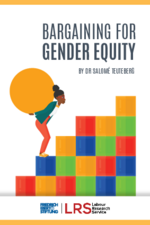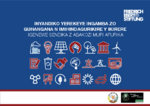Trade unions in Sub-Saharan Africa: between eroding importance and political influence
Trade union organisation in Africa is weak at the national, regional and continental levels and is primarily limited to the formal sector, which means that only the interests of a minority of the working population are represented. In most of Africa's countries, the biggest employer continues to be the state. Trade union structures are marked by a greying of membership, male dominance, dwindling membership, scarce resources and deficits in internal trade union democracy. The African trade union landscape is also characterised and weakened by competitive thinking. As a result, classic trade union interest representation scarcely takes place. Collective bargaining is carried on, if at all, primarily at the company level between employers and sectoral trade unions. The rights of employees are frequently not respected and trade union rights trampled upon.
In spite of all these weaknesses, trade unions play an important role in politics in many countries. Among organisations of civil society, they are still among those that have the greatest potential for mobilisation and the only ones with nationwide structures. At the same time, trade unions are involved in tripartite bargaining over minimum wage negotiations in some countries.
Economic development and labour markets: too little inclusive growth and job perspectives
High unemployment, poor to inhumane working conditions, informality and migration characterise labour markets in Sub-Saharan Africa. Three-fourths of the working population work in precarious jobs - and a majority of them are women. Economic growth in the region, which reached average levels of six per cent for more than a decade and led to coining of the term "Africa Rising", has tapered off. Against the background of declining raw material prices, it remains questionable whether growth paths are sustainable and the poorest can also profit from them. Multinational enterprises from the countries of the North, but also from countries of the South, have established an increasing presence on the continent in recent years. At the same time, China often plays a negative role with regard to employee rights. To create more jobs that are at the same time decent requires not only higher growth rates in general, but also higher incomes and adherence to core labour standards.
Trade union work by the Friedrich-Ebert-Stiftung in Africa
In its work in Africa, the FES concentrates on increasing the representation and organisational capabilities of progressive trade unions, furthering their process of internal democratisation and strengthening their ability to intervene. At the focus of cooperation are the topics of labour and social standards, transnational interest representation based on international framework agreements and union networks regarding multinational enterprises as well as socially just trade and economic policies. Here sustainability means above all the creation of decent jobs, social security, green jobs and green economy. To foster and promote trade unions, the FES set up the Trade Union Competence Centre in Johannesburg, South Africa in 2010.
The topics and objectives of the FES are in harmony with those of the African Regional Organisation of the International Trade Union Confederation (ITUC-Africa). In southern, eastern and western sub-regions, the FES supports cooperation between ITUC-Africa and regional trade union associations. It works together at the national level with the most important Federations, above all COSATU in South Africa, the NLC in Nigeria and TUC in Ghana, as well as branch unions of relevance and research institutes affiliated with trade unions.
You can find additional information regarding international trade union work by the Friedrich-Ebert-Stiftung on the website of the Global Trade Union Project. For more information on trade union work in Sub-Saharan Africa, contact the homepages of individual country offices.
For more information please visit the project's website.





